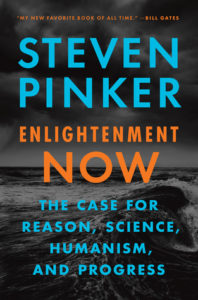Steven Pinker is the Harvard College Professor of Psychology at Harvard University, a two-time Pulitzer Prize finalist, a multiple-award winner for his books, ideas, and research, and has been named one of Time‘s 100 Most Influential People in the World Today and Foreign Policy‘s 100 Global Thinkers.
So when Pinker (pictured above) talks, people listen.
Last Tuesday, February 13, Pinker released his brand new book, Enlightenment Now: The Case for Reason, Science, Humanism, and Progress (Viking), in which he contends that despite bad things happening throughout the world, it’s actually becoming a better place.
 Enlightenment Now includes 75 charts and graphs, in addition to Pinker’s well-crafted arguments, to support his claim that “life, health, prosperity, safety, peace, knowledge, and happiness are on the rise.” Pinker also contends that this progress “is not the result of some cosmic force [but] a gift of the Enlightenment: the conviction that reason and science can enhance human flourishing.”
Enlightenment Now includes 75 charts and graphs, in addition to Pinker’s well-crafted arguments, to support his claim that “life, health, prosperity, safety, peace, knowledge, and happiness are on the rise.” Pinker also contends that this progress “is not the result of some cosmic force [but] a gift of the Enlightenment: the conviction that reason and science can enhance human flourishing.”
Then, the very next day, February 14, a teenager gunned down 17 people at a Florida high school. It was an event that could, on the one hand, “support” Pinker’s contention that there is no “benevolent shepherd who looks out for human welfare,” as he told MSNBC, referring to the Florida shooting.
“What was the benevolent shepherd doing in Florida while that teenager was massacring his classmates?” Pinker told Hugh Hewitt. “If you’re counting on God to make the world a better place, then you’re probably going to make the world a worse place, because he’s not listening.” (Many South Floridians would beg to differ.)
Still, Pinker is one of the world’s most respected thinkers, and his ideas certainly have merit . . . which explains why Enlightenment Now immediately became one of the Top 20 best-sellers at Amazon.
Addressing big questions
Is the world getting better? Is there progress? Should we be optimistic? And, if so, what has science and reason and humanism contributed to the progress? And has Pinker provided convincing answers to these important questions, particularly in arguing that if the world is better, God had nothing to do with it?
Pinker elaborates on his ideas in an interview with The Washington Post:
“The main idea is a belief in progress—not a faith that it will happen by itself, but a realization that when people strove to improve the human condition in the past, they gradually succeeded,” he says. “They came up with democracy, and vaccines, and hybrid crops, and the rule of law, and a free press, and much else.
“And they did it because they held certain values. They valued reason: the conviction that logic and evidence are better than authority, charisma, gut feelings or mysticism. They valued science: the idea that we can understand the world by proposing explanations and testing them against reality. And they valued humanism: the idea that the well-being of men, women and children is more important than the glory of the tribe, race or nation.”
Is it convincing?
Bill Gates is among those convinced by the observations in Pinker’s new book.
“The world is getting better, even if it doesn’t always feel that way,” he said in endorsing Enlightenment Now. “I’m glad we have brilliant thinkers like Steven Pinker to help us see the big picture.” Gates adds that Pinker’s latest is now “my new favorite book of all time.”
But the University of Chicago’s Martin Marty isn’t so convinced:
“Why must ‘faith’ and ‘Enlightenment’ be seen only as contradictions of each other?” Marty writes at RNS. “Most sentient humans, as individuals and in groups, find sundry ways of being, thinking, and acting. In my faith tradition we speak of the human creature as being simul iustus et peccator, ‘at the same time righteous and a sinner.’ Which of these sides of our humanity manifests in various circumstances depends upon what kinds of questions are asked, and what perspectives and intentions are in play.”
Other reviews of Enlightenment Now:
- In Nature, Ian Goldin finds limitations to Pinker’s optimism.
- In Harvard Magazine, historian Ada Palmer asks if science can justify itself.
- In the Times Literary Supplement, historian David Wootton isn’t necessarily buying Pinker’s explanation for why things are getting better.
(Pinker photo: Shutterstock: Christopher Halloran)